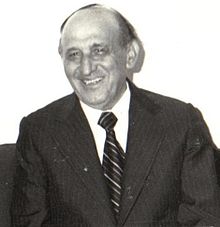Todor Zhivkov
Todor Christow Schiwkow ( Bulgarian Тодор Христов Живков , scientific transliteration Todor Christov Živkov ; born September 7, 1911 in Pravets ; † August 5, 1998 in Sofia ) was a communist Bulgarian politician . From March 4, 1954 until his forced resignation on November 10, 1989, he was Head of State of Bulgaria and First Secretary of the Bulgarian Communist Party . This made him the one with the longest term of office of all the heads of the Warsaw Pact member states .
Life
Zhivkov was born to poor farmers in the small village of Prawez . As a teenager, he moved to Sofia in search of work and a better future . There he became a member of the Dimitrovsky Komsomol , the youth department of the Bulgarian Communist Party (BKP) at the time.
During the Second World War Zhivkov rose to the party and was involved in the resistance of the "People's Liberation Army" against the German Reich. In the post-war period, Zhivkov held important positions within the government, which was now supported by the Soviet side, including head of the People's Militia, which under his leadership imprisoned thousands of people for political reasons. In 1950 he became secretary of the central committee of the BKP. In 1951 he became a full member of the Politburo of the Central Committee and in 1954 General Secretary of the Central Committee and thus the youngest “party leader” of an Eastern Bloc country .
In the first two years of Zhivkov's tenure as general secretary of the party, the Stalinist- oriented Valko Chervenkov was still the actual head of state; However, he was forced to resign in 1956 after Khrushchev had initiated the process of de-Stalinization after Stalin's death in 1953 . In 1965, Zhivkov survived a coup attempt by renegade army officers and party members; such an incident was unique in a communist country.
During his tenure, Bulgaria's economy experienced high growth rates and underwent a rapid structural change from an agricultural country to an industrial state . Zhivkov drove the urbanization of his country forward massively. The general supply situation improved considerably. The educational level of the population also rose rapidly. Nevertheless, Bulgaria remained one of the poorest countries in Europe alongside Romania and Albania . The dictator fought the political opposition in the country with extreme severity; Thousands upon thousands of people were imprisoned as dissidents all over Bulgaria.
As the protégé of Khrushchev and personal friend of Leonid Brezhnev , Zhivkov was known for his extremely loyal attitude to the USSR during the Cold War . He even suggested annexing Bulgaria to the Soviet Union in 1963 and 1973, using the arguments of common Slavic origins and similar Cyrillic writing system . The writer and regime critic Georgi Markov once said that "he served the USSR with more ardor than the Soviet leaders themselves."
According to a testimony (April 1991) of Oleg Kalugin (a major general of the KGB ), Zhivkov personally ordered the assassination of Markov by the 1978 umbrella attack .
Towards the end of his tenure, Zhivkov made several attempts to modernize Bulgaria and introduce weakened versions of glasnost and perestroika , without, however, wanting to give up control of the country entirely. However, these attempts could not prevent his own impeachment and ultimately the fall of real socialism . In 1989 he was expelled from the Bulgarian Communist Party and arrested on January 18, 1990. Two years later, he was sentenced to seven years' imprisonment for looting the state coffers and corruption, which was commuted to house arrest in 1996 for health reasons .
Zhivkov died on August 5, 1998 of pneumonia .
Family and children
His wife Mara Maleewa died in 1971.
Todor Zhivkov tried to secure a career in the hierarchy of the Bulgarian Communist Party for his children : his daughter Lyudmila became a member of the Politburo and Minister of Culture. She pursued some ideas based on Far Eastern philosophies that were frowned upon by the old guard. Some uncertain sources believe that her early accidental death in 1981 was due to Soviet interference. Her husband Ivan Slavkov was appointed head of the Bulgarian State Television and later was President of the Bulgarian Olympic Committee .
Meanwhile, his son Vladimir Zhivkov led a playboy life. Because of his drinking binge, he could not be promoted higher than chairman of the youth association (Komsomol).
Descendants of Zhivkov's family now live in Germany, Austria, Canada and Bulgaria.
Web links
- Literature by and about Todor Schiwkow in the catalog of the German National Library
- Works by and about Todor Schiwkow in the German Digital Library
- Todor Schiwkow in the Munzinger archive ( beginning of article freely accessible)
Individual evidence
-
↑ Klaus Brill : Mysterious "umbrella murder" cleared up - poison straight from the dictator. In: Süddeutsche.de . May 11, 2010, accessed November 10, 2019 . "Wet things" disappeared . In: Der Spiegel . No.
47 , 1991, pp. 184-185 ( Online - Nov. 18, 1991 ).
| predecessor | Office | successor |
|---|---|---|
| Anton Yugov |
Prime Minister of Bulgaria 1962–1971 |
Stanko Todorow |
| personal data | |
|---|---|
| SURNAME | Zhivkov, Todor |
| ALTERNATIVE NAMES | Живков, Тодор Христов; Zhivkov, Todor Christow |
| BRIEF DESCRIPTION | Bulgarian politician, head of state of Bulgaria |
| DATE OF BIRTH | September 7, 1911 |
| PLACE OF BIRTH | Prawez |
| DATE OF DEATH | August 5, 1998 |
| Place of death | Sofia |



